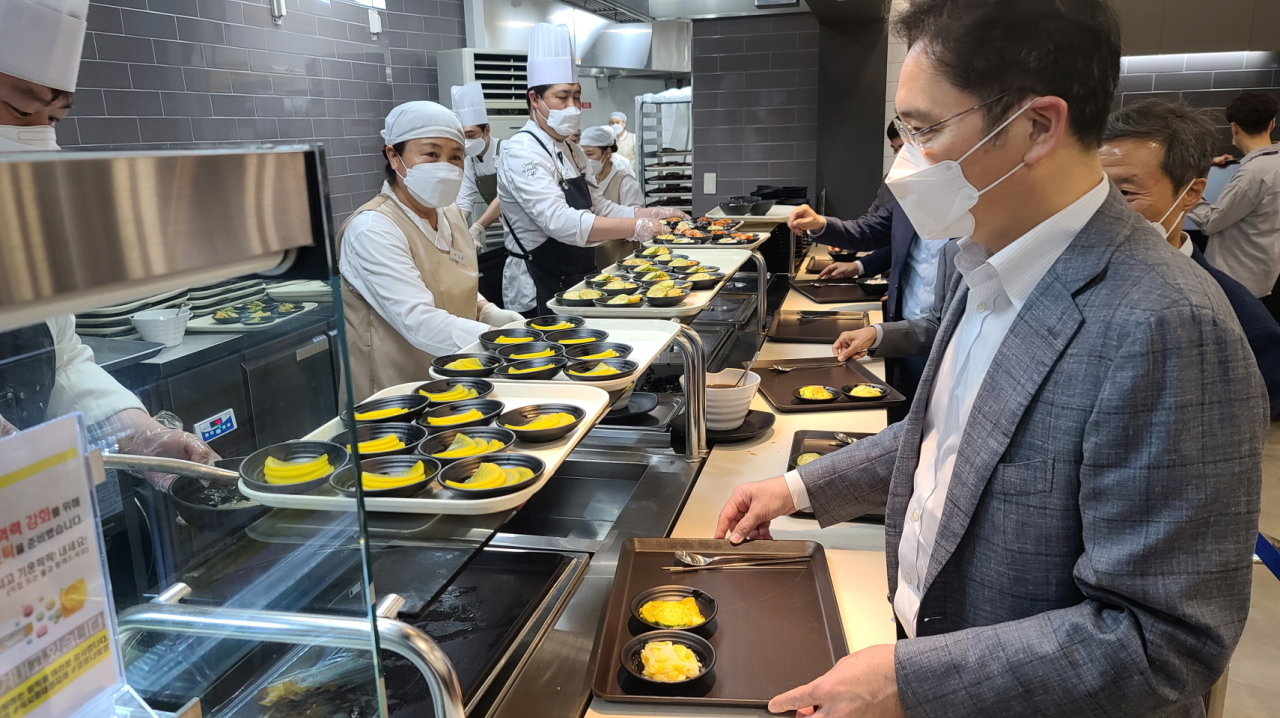A hefty fine given to four Samsung companies, including Samsung Electronics, by the Fair Trade Commission late last month has dealt another blow to South Korea’s top conglomerate in terms of compliance.
On Friday Kim Ki-nam, chief of Samsung’s semiconductor business, currently the most powerful person at the company while de facto owner Lee Jae-yong is in jail, urged executives and employees to continue making “ceaseless efforts to maintain compliance rules” in a letter sent via the company’s intranet.
The message came a week after the country’s antitrust watchdog slapped the four firms with a total of 234.9 billion won ($207.5 million) in fines, saying the firms had engaged in unfair deals with Samsung Welstory, a food service subsidiary of Samsung C&T that offers meals for their workers, from April 2013 till June this year.
That the firms placed all their meal orders with Welstory during that time, without open bidding, should be seen as a deliberate effort to grow Welstory’s value to the benefit of the Lee family, it said.
The FTC’s judgment has added a new dimension to the long and drawn-out debate over the father-to-son succession of control at the Samsung empire.
Lee Jae-yong, who inherited the top post at Samsung from his late father, Lee Kun-hee, is now in jail for bribing former President Park Geun-hye in an effort to smooth out his ascension. He is standing trial separately over irregularities found in a series of transactions among Samsung companies, which prosecutors say were all steps intended to tighten the junior Lee’s grip over the group.
The Welstory allegation is a new addition to the list. The FTC maintains that employees at the four Samsung companies were fed by Welstory in a typical case of conglomerates usurping corporate opportunities to enrich the owner families.
It indicted Choi Gee-sung, who was the chief of Samsung’s now-defunct control tower the Future Strategy Office, on charges related to his alleged role in orchestrating the transfer-pricing scheme.
Welstory, a cash cow for the Lee family? The FTC could not present any evidence that the catering contracts with Welstory were unfairly valued, but said from the sheer volume of orders given to the firm, it was clear that the firm acted as a “cash cow” for Lee Jae-yong.
The jailed tycoon does not hold a single share in Welstory, but controls it via Samsung C&T, the de facto holding firm of Samsung Group. Lee is the largest C&T shareholder with a stake of over 18 percent.
To fully understand Welstory’s role, one has to go back some years.
Until November 2013 the food company was part of Samsung Everland, in which Lee Jae-yong held a controlling stake of 25.1 percent. It was one of the two companies that the then-heir had sizable equity holdings in. At that time, he possessed less than 1 percent of Samsung Electronics, the crown jewel of Samsung Group.
In 2014 Everland merged with Cheil Industries, and the food business was split off from Cheil as a wholly owned subsidiary and named Welstory.
The following year, the controversial merger between Cheil and the old Samsung C&T took place, making the merged Samsung C&T the parent company of Welstory.
Lee Jae-yong now owns close to an 18 percent stake in C&T after inheriting shares from his father. His sisters Lee Bu-jin and Lee Seo-hyun own 6.19 percent each.
The series of corporate deals affecting Everland, Cheil and C&T are considered cornerstones in Lee Jae-yong’s succession plan, enabling him to secure greater equity control over the entire group despite holding very few shares in key units.
The FTC looked into the changes in the status of Welstory during the period between 2013 and 2015, and found that it was the only Everland business that generated reliable profit.
Welstory’s profit came from internal transactions only, the FTC said, calling it “a hidden cream of the crop.” The company maintained around 1 trillion won in annual sales and 100 billion won in operating profit from 2013 to 2019.
Of the annual operating profit, nearly 70 percent came from Samsung Electronics, Samsung Display, Samsung Electro-Mechanics and Samsung SDI, the four companies that were fined, the FTC said. The total operating profit from the firms reached 485.9 billion won.
The company had business deals with non-Samsung companies too, but they were unprofitable and caused an operating loss that amounted to 10.3 billion won during the period.
The Future Strategy Office, which at that time was in charge of orchestrating a groupwide response to strategic issues and devising a road map for the heir’s succession, appeared to have clear incentives to meddle in the catering business and order affiliates to sign with Welstory, the FTC said.
“With stable profits from the large-scale internal contracts for employees’ meals, Welstory played a role as a key cash cow,” it said.
Samsung C&T received 275.8 billion won in dividends from Welstory between 2015 and 2019, the agency said.
More legal battles ahead Samsung Electronics denies the allegations.
The tech giant said it will take legal action to prove that nothing illegal was done.
“As a company, we tried our best in providing quality meals,” the company said in a statement. “The ruling could negatively affect the company in terms of public opinion and other ongoing investigations and court decisions.”
It emphasized that there were no marching orders from the top brass, and said executives only wanted to ensure that employees ate well.
Samsung also denied the FTC claim that Welstory was a cash cow for the owner family.
“The FTC said 75 percent of the total operating profit of Samsung C&T comes from Welstory, but the figure was restricted to the third quarter of 2015,” Samsung said. “Welstory accounts for 10 percent of C&T’s operating profit on average.
“And the percentage of Welstory’s dividends is a mere 8.6 percent, which makes the FTC’s claim sound quite absurd.”
But for many ordinary Samsung employees, the meals provided by Welstory were not always satisfying.
In 2012, employees at Samsung Electronics’ Hwaseong and Giheung plants complained about the quality of the meals. Subsequently, Welstory made efforts to improve their quality by increasing food costs at the order of the control tower. Its operating margins fell from 22 percent to 15 percent at the end of the year.
“If Welstory was that important to the owner family, such efforts wouldn’t have been made to the extent of seeing losses,” an industry official explained.
The FTC found signs that the Future Strategy Office was directly involved in changing the contract terms between the Samsung companies and Welstory. This brought about an increase in overall food costs, and in the quality of meals for employees, without hurting Welstory’s margins.
“The terms of the contracts were so unconventional and unseen within the food catering industry,” the FTC said.
The Future Strategy Office was also found to have intervened at least twice to stop a planned open-bidding process at the companies, which would have allowed outside food companies such as Ourhome, Hyundai Green Food, CJ Freshway and Shinsegae Food to compete with Welstory, the agency said.
The Welstory case recalls the case of Hyundai Glovis in 2007, industry watchers point out.
The FTC imposed a fine on Hyundai Motor Group for channeling all of the group’s car freight contracts to its logistics arm Glovis, which was 43.4 percent owned by Honorary Chairman Chung Mong-koo and his son, current Chairman Chung Euisun.
In 2015, the owners reduced their shareholdings in Glovis to 29.9 percent in a bid to circumvent the FTC’s regulations on the usurpation of corporate opportunities.
Hyundai appealed the FTC ruling, but canceled the appeal abruptly. And Glovis is still on the radar of the antitrust agency, since more than a fifth of its profits come from transactions with Hyundai affiliates.
In the case of Samsung Welstory, the FTC has invoked the rule aimed at banning chaebol families from taking away corporate opportunities to serve their own personal interests, as well as regulations that ban any act that systemically supports such intragroup deals among chaebol companies.
By Song Su-hyun (
song@heraldcorp.com)









![[Herald Interview] How Gopizza got big in India](http://res.heraldm.com/phpwas/restmb_idxmake.php?idx=644&simg=/content/image/2024/11/20/20241120050057_0.jpg)